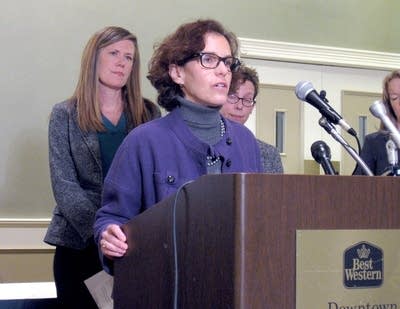Police enlist hotels in fight against sex trafficking
Go Deeper.
Create an account or log in to save stories.
Like this?
Thanks for liking this story! We have added it to a list of your favorite stories.

The hospitality industry in Hennepin County is the latest frontline against child sex trafficking.
Hotel employees received training from law enforcement Tuesday to spot possible cases of juvenile sex trafficking. Hospitality employees will be on the look-out for signs such as guests without luggage, rooms paid for in cash and young girls with significantly older males.
Last year, hotel workers in Ramsey County and Minnetonka underwent similar training to help spot suspicious activity and report it to law enforcement. Authorities said hotels and motels are often where underage girls are sold for sex.
Hotel workers are often the first to notice when something isn't right, said Minneapolis police Sgt. Grant Snyder, who led the training.
Turn Up Your Support
MPR News helps you turn down the noise and build shared understanding. Turn up your support for this public resource and keep trusted journalism accessible to all.
"Nobody is better at recognizing problems in their hotel. Recognizing when something's amiss, when someone needs help or when someone's in danger. No one's better at that than hotel employees," Snyder said. "What we're trying to do here is engage the hotel employees, engage law enforcement, engage our other partners into a collaboration that allows us on a very expansive, community level to be able to target this on the way that it should be targeted."
Hotel employees and guests are encouraged to report suspicious activity, but not to try to confront it on their own.
Lt. Greg Reinhardt, who is in charge of child abuse and sex trafficking investigations for the Minneapolis police, said they have made 19 sex-trafficking arrests since January 2012.
"The hotels are scattered, not just in Minneapolis, but all over the metro area. It's everywhere. It's as easy to dial up and call for a juvenile trafficked victim to come to your room as a pizza," Reinhardt said. "In 20 minutes or 30 minutes somebody will deliver a young girl there."
According to the Minneapolis police, all but one of the child sex trafficking cases charged in Minneapolis in 2012 involved the use of hotels, and those hotels helped provide evidence for conviction.
"In all these cases, the hotels were able to provide meaningful evidence to support conviction," said Minneapolis Police Chief Janee Harteau, who welcomed the new partnership and called combating juvenile sex trafficking "a priority" for the department.
Dan McElroy from the Minnesota Lodging Association which represents 330 hotels across the state said the hospitality industry wants to prevent crimes from taking place at its establishments.
"Our members are unhappy, irate at any crime that takes place in a hotel. Crime in a hotel isn't fair to our guests; it's extremely stressful for our team members; it can damage our reputations," McElroy said. "But crimes involving kids, as one of my members said, it makes her blood boil. One of my members said, 'I just can't imagine having one of my future guests having to sleep in a bed where a little girl was abused."
— Follow Sasha Aslanian on Twitter: http://www.twitter.com/sashaaslanian




